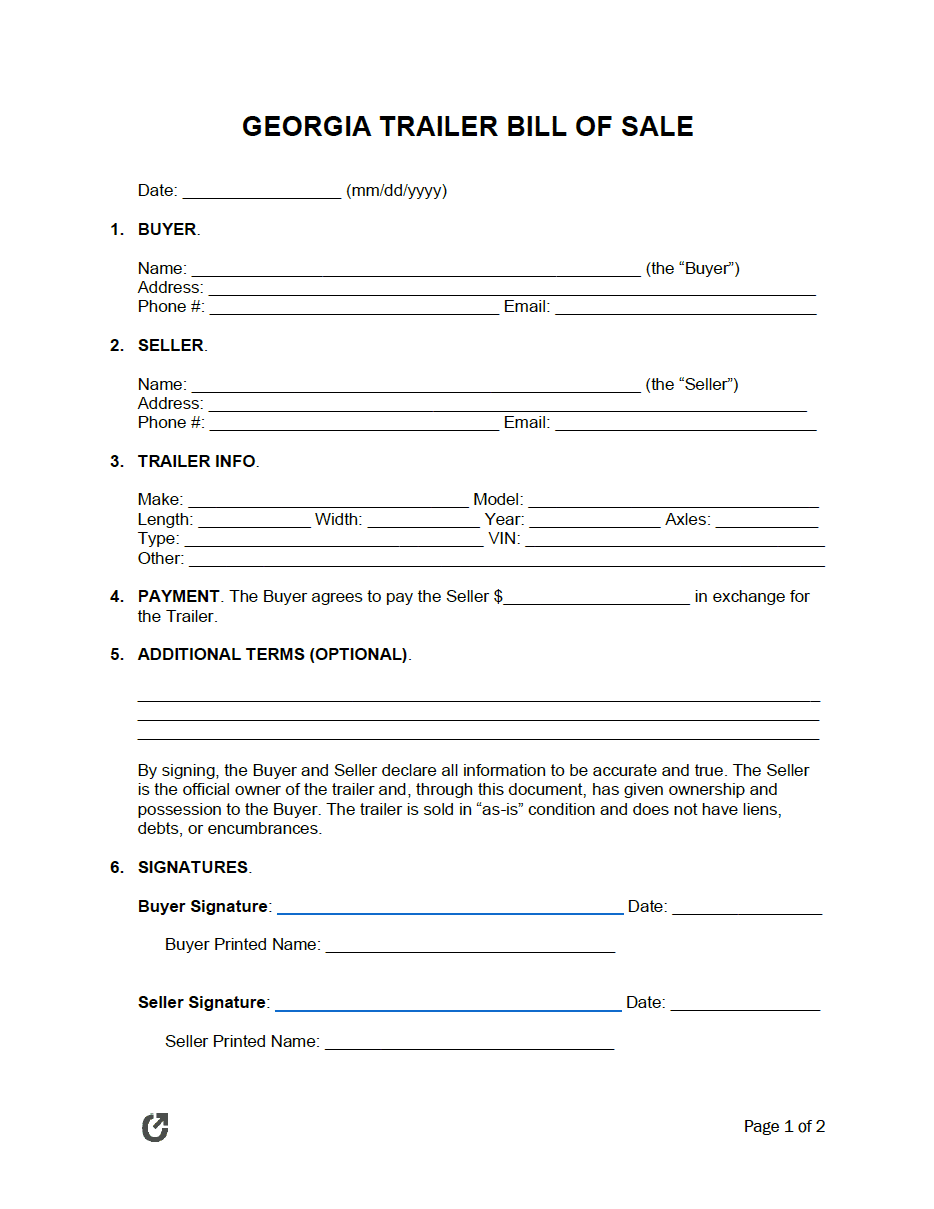Georgia Trailer Bill of Sale Form
A Georgia trailer bill of sale form lists the elements of a transaction between a merchant and customer. It lets the seller disclose the trailer’s make, model, dimensions (length and width), year, axles, type, identification number, and other relevant details. The document also verifies the purchase date and the day that both parties signed. Each person or business associated with the deal can reference the bill of sale to obtain fundamental data about the transfer.
What is a Georgia Trailer Bill of Sale?
A Georgia trailer bill of sale serves as a written log of the business negotiation. The form identifies the trailer, as well as its purpose and value. In addition, it names the transferor and transferee and verifies their identities through their personal information.
Per state law, trailer sales in Georgia require proof of ownership. Furthermore, the buyer must present a verifying document when registering the carrying platform. Bill of sale forms meet the criteria as long as they identify the trailer and each person involved. While not required, notarization further substantiates the purchase in the eyes of the Department of Revenue (DOR).
How to Register a Trailer (3 Steps)
Utility and boat trailers in Georgia require registration but do not need a title. Residents must register their trailer within seven (7) days of purchasing. Non-residents have thirty (30) days from the purchase or move-in date to register the trailer.
Per state law, individuals cannot pull a trailer without proper plates or tags. The vehicle towing the trailer must also have an insurance policy covering damage in an accident.
Step 1 – Inspection
Only out-of-state and homemade trailers require inspections. This process certifies that the number on the trailer matches the number listed on the official documentation. It also ensures the trailer meets safety requirements for carrying cargo.
Out-of-State Trailers
The owner must present the certificate of title, vehicle registration card, manufacturer’s statement of origin, or another acceptable document to the law enforcement officer at the inspection. The officer reviews the information and conducts the examination. If the trailer passes, the individual provides the owner with certification (Form T-22B). The owner must provide the DOR with the completed and signed document during registration.
Homemade Trailers
Once the trailer has a T-Plate (or serial plate), they must attach it to the trailer. The DOR provides the individual with a half-completed Form T-22C.
Next, the owner must schedule an appointment with a Georgia law enforcement officer to inspect the plate. They must bring Form T-22C, where the officer completes the bottom portion. After this step, the applicant submits the completed Form T-22C and T-23 to the DOR, who issues a Georgia license plate to the trailer.
Step 2 – Registration
Owners can submit their trailer registration documents in-person or by mail. Face-to-face interactions require an appointment with a county tag office.
Individuals must gather the standard forms before the appointment. They must also provide additional documentation, such as Forms T-22B, T-23, and/or T-22C. To ensure they submit the correct paperwork, they should contact their local office before applying.
| Bring the Following: |
Step 3 – Renew
If the owner permanently registers their trailer, they do not need to renew regularly. They only need to contact the DOR if an issue arises or they lose or damage the plates.
Individuals who replace their trailer registration yearly must send documentation to reapply. In most cases, the resident receives a notice, which provides instructions on renewing online at a self-serve kiosk, in-person, or by mail.
The person reapplying must provide: 1) the renewal notice, 2) photo identification, 3) proof of car insurance, and 4) payment.
